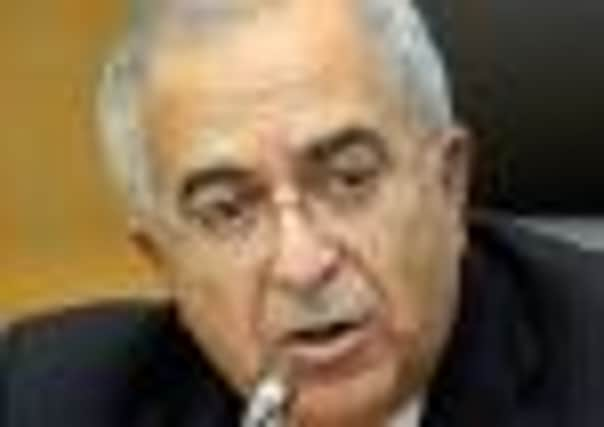Ben Lynfield: Resignation of prime minister a major setback for Palestinians


Mr Abbas accepted prime minister Salam Fayyad’s resignation during a meeting on Saturday evening that came amid increasing differences between the two men over authority and mounting verbal attacks from within Mr Abbas’s Fatah movement against Mr Fayyad – broadsides the president did nothing to stop.
The resignation deprives the Israeli-Palestinian arena of one of its most level-headed, non-ideological and moderate actors. A former board member of the International Monetary Fund, Mr Fayyad, appointed in 2007, injected greater transparency into Palestinian Authority (PA) finances, earning the trust of foreign donors.
Advertisement
Hide AdAdvertisement
Hide AdIn the realm of security, Mr Fayyad played a pivotal role in restoring order to West Bank cities after the security chaos of the second intifada uprising. He also has been a key person in the security “co-operation” with Israel according to which PA forces, to the dismay of many Palestinians, act to prevent attacks on Israel and its army in the occupied West Bank.
But not being a member of Fatah and having only a scant political following, Mr Fayyad was completely dependent on the goodwill of Mr Abbas. Last month the two men clashed over the resignation of finance minister Nabil Kassis, which Mr Fayyad accepted despite Mr. Abbas’s objection.
While Western diplomats who spoke to The Scotsman stressed that the international community’s interests in the PA do not depend on any one individual, Mr Fayyad’s departure cannot be good news for those interested in seeing a viable Palestinian state emerge.
“This is negative because he was considered someone dedicated to delivering on security, preventing terrorism and standing the PA on its own two feet,” said Yossi Alpher, former director of the Jaffee Centre for Strategic Studies. “Will security hold up if he’s not around, particularly if the PA cannot pay its salaries? And will donor countries continue delivering money?”
Mr Abbas’s challenge now is to find someone acceptable to both Fatah and the international community. One name being mentioned is Dr Mohammed Mustafa, an economist and head of the Palestine Investment Fund.
However, it is possible Mr Abbas will retain the premiership for himself, especially if he is interested in advancing a reconciliation with Hamas, the militant Islamic group that seized control of the Gaza Strip in 2007.
Mr Abbas and Hamas leader Khaled Meshaal last year agreed that Mr Abbas could serve as prime minister of a cabinet of technocrats that would pave the way for new Palestinian presidential and legislative elections.
But the deal was not implemented, in part because of Mr Abbas’s concern over Western reaction. One determinant of whether Mr Abbas tries to head down that route is his assessment of whether there is anything to be gained from current US efforts to restart Israeli-Palestinian negotiations.
Advertisement
Hide AdAdvertisement
Hide AdMahdi Abdul-Hadi, director of the Palestinian Academic Society for the Study of International Affairs, predicts that international donors will keep funding the PA even without Mr Fayyad as premier. “Everyone will continue paying because they are interested in the survival of the PA,” he says.
• Ben Lynfield reports for The Scotsman from Jerusalem